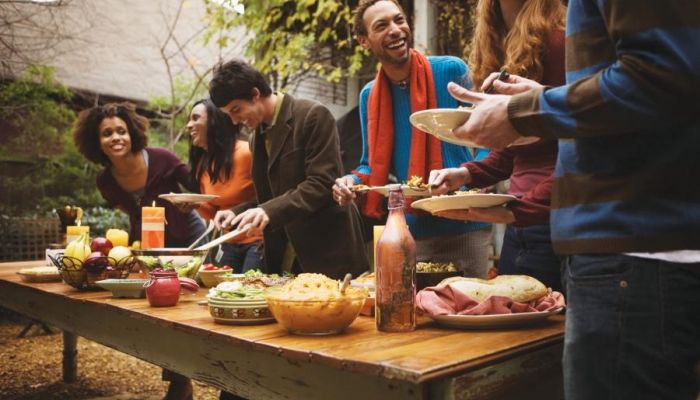Eating is earthly but feasting together is divine
1 June 2022

The surprising impacts of sharing a meal
Words Justine Toh
I remember a dinner party last summer. Balmy weather, table set for seven, the mosquito coil burning away, music. We sat down to eat after a considerable wait for all to be ready, but no one tucked in. There was a pause, self-conscious laughter. Someone said, “It feels like we should say … a prayer or something.” I had wanted to suggest something along those lines but didn’t want to intrude on the faiths (or none) of others.
But there was a kind of openness or gratitude in the air that night. We wanted to give thanks for friendship, for time together, and for the succulent spread before us.
Something mysterious happens when we sit down together to eat. The sensual pleasures of food – its sights, smells, tastes and textures – ground us in our bodies and the immediate present by stirring the individual appetite. We might be tempted to fill our bellies, and fast.
At the same time, however, eating in company can take us outside of ourselves – so much so that we might be inspired to thank a god not everyone acknowledges is actually there. Feasting with others, in other words, can stir a spiritual appetite that not even food can satisfy – and I think this was what happened that summer evening.
So, eating might be earthly, but feasting together borders on the divine. How so?
TOGETHERNESS
A banquet brings people together – even more so when we share from a communal plate. So many of our social interactions are mediated through individualising technologies like the iPhone. This ‘iLife’ we live is momentarily suspended when we gather around to break bread together. A feast also challenges the rampant individualism of our culture by giving us the opportunity to serve and wait upon each other, which reminds us of the importance of relationships in our lives.
Moreover, food can nurture a healthy attitude towards difference. What we choose or refuse to eat, and with whom we do so, often marks boundaries between personal tastes, cultures and religions. If we are what we eat, then when we eat only what we know and like, we’re reconfirming our ideas about ourselves and the world.
OUTSIDE THE COMFORT ZONE
On the other hand, trying out unfamiliar foods, as well as supping with strangers, allows us to not only experiment with our tastes but play with our ideas about who we are and who we might be. Or at least reconsider our position. There’s something generous and humble in that.
So, food threatens our self-containment by opening us up to differences and each other. In encouraging us to let go of ourselves and our own interests, food also introduces the possibility of grace: kindness that arrives, unexpectedly, from elsewhere.
At another table in times past, a different god declared that he, Jesus Christ, was the ‘bread of life’. Christians understand Jesus to mean that just as bread was broken and its nourishment shared by all, so was Jesus’ body broken so that humans could have life to the full. This ‘bread of life’ is a foretaste of heaven – described as a rich banquet to which all are invited. This sensuous description of heaven is all about feasting, abundance and celebration. It announces the arrival of not only the good life but perhaps the best kind of life of all.
I fondly remember that summer dinner party and the moment my friends and I felt the need to say thank you for each other and for the meal we were about to receive. If only we could have agreed on who deserved our thanks.
Justine Toh is Senior Fellow at the Centre for Public Christianity and the author of Achievement Addiction.
This article was originally published in ABC Religion & Ethics Portal.

Comments
No comments yet - be the first.